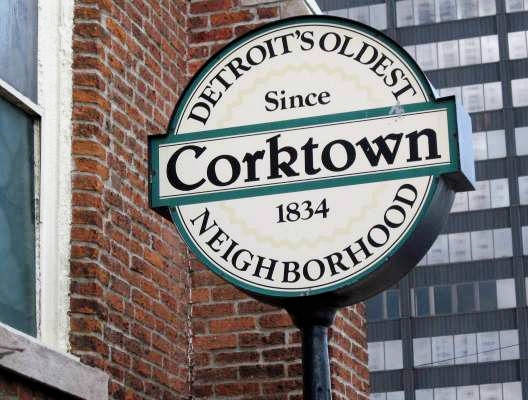
Nearly 200 apartments are proposed on Michigan Avenue at 10th Street, opposite the Detroit PAL ballfield. (Rendering: Elkus Manfredi Architects)
Corktown residents are challenging a developer's plans for this 188-unit apartment building on a block of Michigan Avenue opposite the old Tiger Stadium site. Neighbors voice concerns about traffic, noise and light pollution and further gentrification of Detroit's oldest residential section.
Louis Aguilar of Bridge Detroit tracks what's going on:
The Southwest Detroit community has seen a flurry of interest by outside developers since Ford Motor Co. declared in 2018 it is investing $740 million in the area, including reviving the long-dead Michigan Central Station. ... Townhomes are being built amid the historic single family homes. Longtime businesses ... have abruptly shut as the building owners seek more lucrative tenants.
With so much change taking place and more on the way, residents say the time is now to defend its historic architecture and the character of the diverse community,
The first test of that stance is happening now with a multi-million dollar proposal to build a new seven-story apartment building and parking garage in the heart of the neighborhood. ... There have been four community meetings with the developers so far. At each one, nearly all the residents present raised objections.
The extensive project includes seven townhouses at 10th and Church streets behind the seven-story apartments at 1611 Michigan Ave., and a three-story garage on Church Street near Trumbull. To clear land for the parking structure, developers want to demolish at least part of a warehouse dating to 1894.
The Corktown Historical Society and nearly 20 residents last month "urged the Detroit Historic District Commission to rule against the developer's plan to raze the Church Street building," Aguilar writes. The 19th century survivor, site of a Downtown Self-Storage business, began as a sawmill and was expanded in 1916 for the Red Arrow Soda factory -- which bottled and sold beverages there until the mid-1970s.
The historical society says it's "supportive and excited about new residential/commercial development," but adds in a Facebook post last weekend:
It's disheartening to potentially see another piece of Corktown/Detroit's history become just another parking [site].
Our amazing community has been gathering to save this historic building. ... We thank the community for continuing to fight.

(Photo: Facebook/Corktown Historical Society)
At Bridge Detroit, Aguilar reports:
At the latest community meeting, the developers said they would agree to save part of the historic Church Street building ... [and] reduce the number of parking spaces to less than 400. ...
Suggested changes have not appeased many neighborhood residents, with many stepping up their objections and starting a petition. ... Residents say the petition is meant to make clear the community’s stance for future developers who buy historic buildings with the intent to demolish them.
The development team, named Oxford Perennial, consists of Hunter Pasteur Homes from Farmnington Hills, Oxford Capital Group in Chicago and Forbes Co. of Southfield. Hunter Pasteur and Oxford are also the main firms behind a seven-story boutique hotel, the 227-room Godfrey Hotel, planned in Corktown at 1401 Michigan Ave. -- two blocks west of the proposed apartment building.
The next public meeting is at 6 p.m. Thursday via Zoom, followed by a sixth session May 13. Register here for either or both.
Project renderings:

Rear of the seven-story apartment building, facing Church Street. (Renderings: Elkus Manfredi Architects)

Church Street garage design concept.











